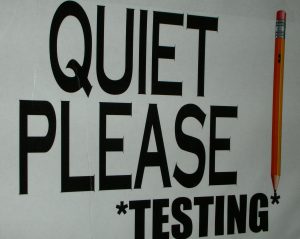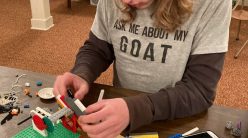 If your teenager will be taking the SAT, ACT, PSAT or other important standardized tests soon, you may both be starting to worry about how well he or she will do on the exams.
If your teenager will be taking the SAT, ACT, PSAT or other important standardized tests soon, you may both be starting to worry about how well he or she will do on the exams.
Homeschoolers often have less experience with standardized tests and may have test anxiety. There can also be extra pressure to perform well on the tests, since colleges look less at grades for homeschooled applicants and may pay special attention to test scores.
Here are eighteen ways to help your teen or tween become a master at test-taking.
- Start doing some low-stress testing as part of homeschooling. You can easily generate your own quizzes and tests in Google docs for free, and you can even make them self-scoring. Start with relatively easy tests that review material that your teen has been learning. Be sure to keep it low-pressure so you don’t increase test anxiety.
- Familiarize her with the test she’ll be taking. Most tests have thorough information about what to expect online, such as this free Getting Ready for the SAT PDF guide that even includes a practice test. Be sure your teen understands how to fill out the various sections, since some are fairly confusing.
- Have him do the official SAT Question of the Day each day. This is a short and easy way to get experience with the test and what to expect in small doses that’s aren’t likely to overwhelm those with test anxiety.
- Take some tests together. Sit down together and answer a test yourself with your teen next to you. Talk out loud about each question — read the question, talk about which answers you’ll automatically be able to discount, and talk through how you come to the right answer. Then score it together and go back over any you got wrong.
- Teach her simple pacing. She should learn the number of questions on the test and the amount of time to test, in order to figure out how long she can take on each question. Make sure she knows to move on if she isn’t close to the answer after about that much time. She can come back to it with any extra time at the end.
- Remind him to use his scrap paper or extra writing space. Most exams have extra space to work out questions or let you use scrap paper. Instruct your teen to use that space to make visuals, figure out answers, graph, diagram or plug in possible answers when he’s stuck. If he forgets the formula for the perimeter of a triangle, he can just draw a triangle with the measurements of each side and add them, for instance. This sort of thing can be invaluable for kids who are visual learners or tend to think outside of the box.
- Teach her to guess at truly baffling questions — but only on some tests. Since tests are timed, it makes no sense to waste twenty minutes on a question that makes no sense. It makes sense to guess on these questions, as long as there’s no penalty. It’s important to find out ahead of time if the test your teen is taking has a penalty for wrong answers. If your teen is taking a test that doesn’t penalize wrong answers, tell your teen to make educated guesses on those questions and just move on. She can always come back and work on it at the end with any extra time she has when she’s finished with the rest of the exam. However, some exams like the SAT take extra points off for incorrect answers (as opposed to blank questions), in order to penalize guessing. If your teen is taking a test like this and doesn’t have a good guess, it’s better to leave the question blank.
- Teach him how to test possible answers. For math questions, it is generally possible to plug in the possible answers to see which one makes sense. For instance, if you have to solve for x in a problem, you can substitute the possible answers and see which one works.
- Try various test strategies. For instance, some people do best by reading through the test and answering all of the easier questions first, then going back to the harder ones. This can be a good strategy for timed tests where the student may not have time to finish and might not get to easy answers at the end.
- Teach her to check her answers when she’s finished. Be sure your teen knows to go back and check her answers with any extra time left at the end of the test.
- Stress the importance of reading instructions and avoiding simple mistakes. Many kids rush through questions and make simple errors because they don’t read the instructions carefully. Be sure your teen takes the time to fully read the instructions. Also be sure your teen knows to periodically check and make sure the questions and answer bubbles are still matching up. Quite often, kids skip a question and forget to skip the corresponding number on their answer sheets, meaning that every answer after that point is in the wrong spot. Another common error is to not fully erase an incorrect answer (or worse, to mark through it with an x), so the machines mark corrected answers as incorrect.
- Remind him to keep an eye on the clock. This can be reassuring and it can also be important for time management. If the time is near the end, instruct him to just finish up all the questions she can as quickly as possible and then use good guessing strategies for the rest (as discussed in #5).
- Give her good tools. Be sure she has a working calculator that she knows how to use, extra sharpened pencils with good erasers, scrap paper (if allowed) and other supplies that will make it as easy as possible to answer all of the questions.
- Build his confidence. Instead of saying, “You don’t test well,” say, “You don’t test that well yet.” Half of the battle is in perception, and if your child believes he is bad at tests he will always prove himself right. Focus on progress made and embrace the attitude that he will be a pro at taking tests by the time you’re finished working on it together. Be sure to point out improvements and remind him of them when he’s feeling discouraged.
- Be sure she is physically and emotionally stocked for every test. This means your teen should be well rested and have a healthy meal before the test. Concentrate on high protein and whole grains, instead of sugars and refined foods that can cause sugar highs and fatigue later. Help her manage any anxiety before the test with breathing exercises, stretches, positive affirmations or any activities that help her calm herself.
- Check out books to help him prepare. There are many books available through bookstores and libraries to help your teen prepare for individual tests. Get him one or two good ones so he can familiarize himself with the vocabulary, concepts and questions he’s likely to come across.
- Remind her that it’s supposed to be difficult. Some teens and tweens panic when they’re confronted with questions that are beyond their knowledge or abilities. Remind your teen that many of the tests are designed to be virtually impossible to get entirely correct, and it’s okay not to know everything.
- Put it in perspective. Don’t put too much pressure on your teen’s test taking, and be sure he doesn’t either. Remind him that he can generally retake tests if he wants to improve his scores and that there are one small piece of his educational records. Colleges are generally far more concerned with the big picture when it comes to their applicants.
Knowing how to do well on tests is a valuable asset in life, and it continues past even the college years. It’s important not to turn the subject into a source of stress for kids, and instead to give them the tools to feel a sense of mastery.
It can also help to instill a sense of fun into it, especially for kids who are prone to perfectionism or anxiety. Make up some silly tests, do practice tests in goofy outfits or otherwise use a little bit of creativity to take a bit of the fear factor out of it all.
Also be sure that kids know that testing, like most other things in life, takes practice. If they’re unhappy with how they do at it, help them get some more experience and they’ll inevitably become test-taking masters.






One thought on “18 Ways to help your teen test well”-
How Should Non-traditional Homeschoolers Navigate the High School Years? | Magic and Mayhem
(November 6, 2021 - 4:41 pm)[…] 18 Ways to help your teen test well […]